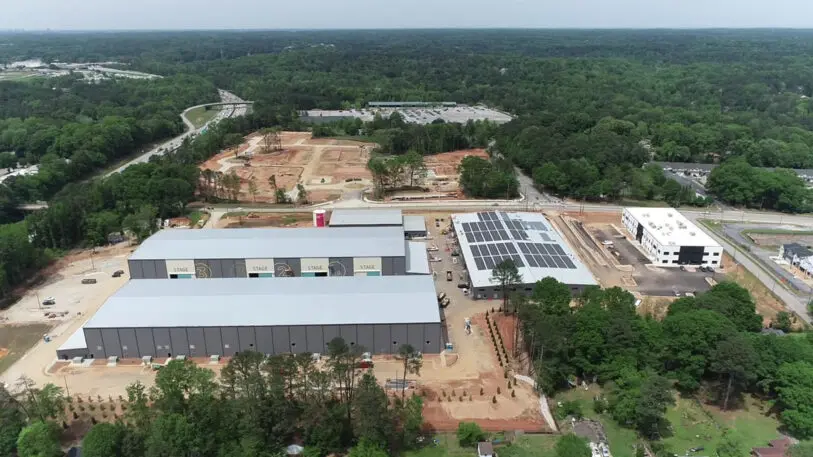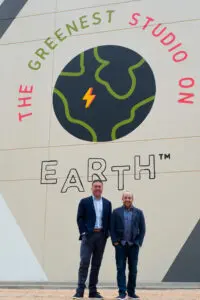The state of Georgia has become a production hotspot for movies and TV as companies look for more space at a cheaper price outside of L.A. and New York. In 2022, productions in Georgia brought in $4.4 billion, and Atlanta has been the home for recent shoots of Stranger Things, Ozark and, well, Atlanta.
But as business booms, studio locations are looking for unique ways to appeal to the major production companies. A new studio hopes its distinct focus on sustainability will attract companies that have to hit environmental targets but whose decisions ultimately come down to the bottom line. The founders believe their eco-conscious offerings can help a notoriously carbon-intensive industry lower its footprint—while keeping costs down.

Opening June 8 outside Atlanta, Electric Owl Studios is a campus of 312,000 square feet, spread across six soundstages, plus huge wardrobes, and mill spaces for set construction.
It’s the first purpose-built LEED gold-certified studio campus in the world and contains solar panels, high-efficiency HVAC systems, 48 on-site EV charging stations, solar-powered golf carts, and opportunities for set recycling and food composting.
Building a studio lot that puts sustainability first was important for the two founders of Electric Owl in what is “traditionally . . . a very wasteful industry,” says co-founder Dan Rosenfelt.

His co-founder Michael Hahn is a real estate developer, having revitalized abandoned properties in Los Angeles and Atlanta. Rosenfelt, meanwhile, is “the movie guy.” He started his career scouting sets for M. Night Shyamalan’s The Sixth Sense and Unbreakable, then worked in production development with the likes of George Clooney. He later went on to run studio sites in L.A. and Atlanta.
Still, neither had backgrounds in sustainability. “It’s not like Mike and I were these diehard environmentalists that knew everything,” Rosenfelt says. Rather, they saw a gap in the market.
Film and TV productions use a huge amount of energy and create a ton of waste. According to a British Film Institute report (called the Screen New Deal), the biggest tentpole movies produce 2,840 metric tons of CO2 equivalent—about the same as driving between Atlanta to San Francisco 2,840 times. Approximately 30% of that is from energy use. The biggest culprit is the intense lighting, and the AC needed so that that heat isn’t “melting makeup off of actors’ faces.” All of Electric Owl’s lights are LEDs, which use much less energy, and its on-site solar panels to provide about 30% of the power.
On the waste front, all sets will be recycled (a stark contrast to industry norms, where demolished sets usually end up in landfills). Electric Owl is working with local company Lifecycle Building Center, which collects pieces of the sets and sells them to other productions; and groups like Habitat for Humanity to donate leftover lumber.
The studio plans to donate leftover catered food to charities where possible. For other scraps, the on-site dehydration machines will make a mulch for use throughout the campus.
These moves align with what major Hollywood producers are trying to do with regards to sustainability targets. Netflix is aiming to halve its greenhouse gas emissions by 2030. NBCUniversal wants to be carbon neutral by 2035.
Emellie O’Brien is the CEO of Earth Angel, a consultancy that works with companies to make their productions greener. She says that while there are sustainable-minded studio lots in Canada and Europe, Electric Owl seems to be ahead of the rest in the U.S. Her company, which has worked on productions from Black Panther to Severance, does things like provide alternative fuel sources for diesel generators, which account for about 15% of total emissions on set. O’Brien says it helps immensely when sound stages have sustainable infrastructure embedded. “It means that we don’t have to worry so much about where our energy is being sourced [or] how our zero waste program is going to work,” she says.
But regardless of how committed a producer is to sustainability, the biggest factor is cost. “They love green elements, but they are also a bottom-line industry,” Rosenfelt says. Electric Owl made it a priority to add sustainability features without dramatically increasing the budget (and thus passing the costs on to productions); in the end, they only added 1% to the total.
The key there was finding the right partners. For example, for the solar power, they partnered with local company Cherry Street Energy, which installed the panels for free and bills the studio at a kilowatt-hour rate. “We could not have afforded to buy solar panels and to pay for the installation ourselves,” Rosenfelt says. “That would have blown us out of the water.”
If prices are competitive, the green facilities are a way to stand out from the crowd, Rosenfelt says. “We want to be a very special boutique hotel for movies and TV shows,” he says. “That’s how we see ourselves.”
Recognize your brand’s excellence by applying to this year’s Brands That Matter Awards before the early-rate deadline, May 3.